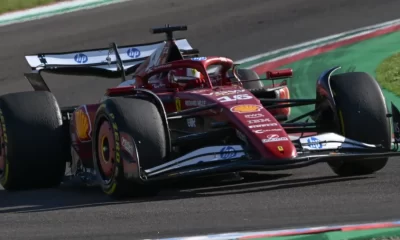Travel
Flight delayed or cancelled due to strikes or storms? Your compensation rights explained
Travel disruption is in the air, but knowing your rights could help you secure a refund, compensation or alternative flight.
It’s the busiest time of the year for air travel, but not all summer flights will get off the ground quite as planned.
With imminent or threatened strikes across Europe – from the UK’s Birmingham Airport to Belgium – it’s worth double checking your journey before you fly.
Other conditions could lead to another summer of travel chaos, Eurocontrol, the organisation that manages Europe’s airspace has warned.
The sheer number of flights – an estimated 33,000 flights per day over the next eight weeks – means that airports and air traffic controllers have a challenging season ahead.
If you’re hit by a perfect storm of travel disruption – or an actual storm – it’s important to consider your options.
Here’s what to do if you’ve got flights booked this summer and how to get your money back if your trip is cancelled or delayed.
Should I cancel my flight?
If you’ve already booked travel plans, it’s probably best to keep them – though it depends on the airline you are flying with.
The UK’s Travel Association (ABTA) has urged would-be travellers not to cancel their flights.
“While it is really disappointing if you do experience a delay or cancellation, you do have rights, including for a replacement flight or refund, plus significant compensation in most cases when flights are cancelled less than 14 days before departure,” an ABTA spokesperson said.
“If you are thinking of cancelling in advance or postponing your trip, make sure you check the terms and conditions of your booking before doing so as you are likely to incur some costs.”
Most airlines will charge a hefty cancellation fee if you cancel your flight unless you’ve purchased a refundable option
However, if you decide you do want to cancel, keep an eye on timings – providers may offer a partial refund before a certain date. You don’t want to miss this deadline.
What should I do if my flight is cancelled?
If your flight is cancelled you have the right to choose between a refund, rerouting or return. If you choose any of these three options you no longer have rights to the other two.
The airline is required to try and get you to your destination as soon as possible even if this involves travelling with a different carrier.
During strike chaos, the airline might not be able to offer to reroute you or provide you with a return under comparable transport conditions at the earliest opportunity. In this case, it has to reimburse your flight cost.
If the airline does not give you the choice to rebook your ticket but you buy another ticket to get home under comparable transport conditions, they have to give you the price difference between your original ticket and the costs of the new ticket.
You are still entitled to the choice if the cancellation happens after the aircraft took off but was forced to return to the airport of departure.
If you accept rerouting it is no longer considered a cancellation, but a delay. Don’t forget that you can choose the date; you do not have to take the earliest possible journey.
Airlines are also required to give you a choice when reimbursing you between cash or a voucher.
What if my flight is delayed?
You have slightly different rights if your flight is delayed and some of them depend on the duration of the delay and the distance of your trip.
You have the right to assistance when the delay is at least two hours at departure, and to reimbursement and a return flight when the delay is at least five hours.
If your flight is delayed at departure by two hours for journeys of less than 1,500km long, three hours for flights between 1,500 and 3,000km or four hours on any other flight, then you have the right to additional assistance.
The airline must offer you meals, refreshments, accommodation and transfers to accommodation if needed. You also have the right to free telephone calls, emails or, yes, faxes.
If you have to pay for any of these, the airline should reimburse you – just remember to keep the receipts.
What can I do if my flight is overbooked?
If you are denied boarding because your flight has been overbooked then you have a few options.
If you presented yourself on time and had a valid ticket but were denied boarding because the flight was overbooked or for operational reasons, you have the right to compensation and assistance from the airline.
You also have a choice between reimbursement, rerouting, or rebooking for a later flight – the same as if your flight is cancelled.
Can I get compensation if my flight is cancelled?
If your flight is cancelled less than 14 days before the scheduled departure date you could be entitled to compensation.
This amounts to €250 per person for flights of 1,500km or less, and €400 for flights between 1,500 and 3,500km. For all flights longer than 3,500km, it’s €600.
It also means that if two weeks prior to your trip you do not get a notification to say it has been cancelled, the chances that your flight will take off are higher.
You could also be entitled to compensation if you arrive at your destination with more than a three hour delay. Like with cancellations, the amount depends on the flight distance.
Which flights can I get compensation for?
Whether you are protected by EU regulations depends on a number of factors but it might not be as clear-cut as you think.
EU Regulations apply when:
- Your flight is within the EU, no matter what airline operates it
- Your flight arrives in the EU from outside and is operated by an EU airline
- Your flight departs from the EU, no matter what airline operates it
For any kind of complaint or claim to be successful, it’s essential that it wasn’t your fault that you couldn’t get on the flight. Make sure you arrive at at the airport at least two hours before the departure time and have a valid ticket and confirmed reservation.
Are there any exceptions to flight refunds and compensation?
In the case of a ‘vis major’ event, airlines have the right to not pay the compensation above for cancellations and delay. But they still should provide you with assistance like accommodation or rebooking.
The most well-known vis major, or extraordinary circumstances, is poor weather conditions. But they can also be traffic management decisions or security risks. Still, the airline must prove that the delay or cancellation was linked to these extraordinary circumstances and also that it could not have been avoided.
Flight-free alternatives this winter
If you haven’t already booked a flight, why not consider other options?
With a rail network stretching more than 200,000 km, Europe is a paradise for train travellers.
So why not check out Italy or Spain through a train window instead?
It’s better for the planet, too – according to the European Environment Agency, rail travel accounts for 14 grams of CO2 emissions per passenger mile. Air travel generates 285 grams over the same distance.
Travel
Spain orders removal of more than 65,000 Airbnb tourist rentals it says violate regulations
ADVERTISEMENT
Spain has launched a major clampdown on Airbnb properties, ordering the removal of over 65,000 holiday rental listings across the country that fail to comply with regulations.
The Spanish Consumer Rights Ministry cited several violations, including missing licence numbers, not specifying whether the owner was an individual or a corporation, and discrepancies between listed information and official records.
The crackdown comes against the backdrop of Spain’s growing housing affordability crisis, which has sparked widespread protests over rising rents and home prices.
Many Spaniards blame short-term rentals on platforms like Airbnb for worsening housing shortages, particularly in popular tourist destinations like Madrid and Barcelona.
‘No more excuses’
On Monday, Spain’s Consumer Rights Minister Pablo Bustinduy said the move aimed to address the general “lack of control” and “illegality” in the holiday rental business.
“No more excuses. Enough with protecting those who make a business out of the right to housing in our country,” he told reporters.
The nationwide enforcement primarily targets listings in Madrid, Andalusia, and Catalonia, where tourism is most heavily concentrated.
The ministry said it had notified Airbnb about the noncompliant listings months ago, but that the company had appealed the move in court.
Spain’s government said Madrid’s high court had backed the order sent to Airbnb.
Bustinduy said it involved the immediate removal of 5,800 rental listings from the site. Two subsequent orders would be issued until the total of 65,935 removals is reached, he said.
Airbnb intends to appeal new ruling
Official data shows Spain had approximately 321,000 licensed holiday rentals as of November last year- a 15 per cent increase since 2020 – with many more operating without proper licenses.
The Consumer Rights Ministry opened an investigation into Airbnb in December last year.
Airbnb told Euronews Travel it will continue to appeal against all decisions linked to this case.
“No evidence of rule-breaking by hosts has been put forward, and the decision goes against EU and Spanish law, and a previous ruling by the Spanish Supreme Court,” a spokesperson said.
“The root cause of the affordable housing crisis in Spain is a lack of supply to meet demand. The solution is to build more homes – anything else is a distraction.”
The spokesperson added that governments across the world are seeing that regulating Airbnb does not alleviate housing concerns or return homes to the market: “It only hurts local families who rely on hosting to afford their homes and rising costs.”
Barcelona bans short-term rentals
Last year, the Spanish government launched a general crackdown on holiday rentals amid growing frustration among residents who say mass tourism is aggravating a housing crisis.
Locals say they are being priced out of their cities due to gentrification and landlords favouring more lucrative short-term tourist lets.
Barcelona has already taken aggressive measures to address the problem, announcing plans to eliminate all 10,000 licensed short-term rental apartments by 2028 to prioritise housing for permanent residents.
Travel
Brits could soon enjoy shorter passport control queues at EU airports. Here’s why
British holidaymakers will soon be able to use e-gates at more EU airports, the UK government has announced.
It comes as part of negotiations between the UK government and the European Union to finalise a ‘post-Brexit reset deal’.
It means British passport holders will no longer have to wait at manned desks and will instead be allowed to use fast-track e-gates usually reserved for EU or European Economic Area citizens.
EU Relations Minister Nick Thomas-Symonds said this would give British travellers “more time to spend on holiday or work trips […] doing what you want, not being stuck in queues.”
The UK government said the move would end “the dreaded queues at border control.”
UK travellers have to join ‘other nations’ queue at EU airports
Following Brexit, UK citizens forfeited their privileged status when travelling to EU countries.
They now fall into the ‘visa-exempt third-country nationals’ category – the same classification as travellers from dozens of countries, including Australia, Canada, New Zealand and Singapore.
This has meant British travellers must join the ‘other nations’ queue at border control rather than using the expedited EU lanes.
The requirement to check that British travellers meet entry conditions is a significant obstacle to allowing them to use the fast-track lanes.
EU border control has to verify that UK travellers are not in breach of the 90-day stay limit in 180 days and that they have the means to return to their country of origin, i.e. a flight ticket out of the EU.
Frontier officials must also stamp the passenger’s passport.
This change often translates to extended waiting times, especially at busy European airports like Amsterdam Schiphol, Milan Malpensa, and Paris Charles de Gaulle.
Waits exceeding an hour have become commonplace, especially when arriving shortly after large international flights.
These delays affect not only entry into EU countries but also departure, as British travellers must undergo exit checks that sometimes result in missed flights due to lengthy queues.
UK travellers will be able to use e-gates at many European airports
Under the new deal, British travellers will be able to take advantage of the faster e-gate passport checks at many EU airports.
No details have yet been released on when this will be introduced and where, although the BBC reported that British Prime Minister Keir Starmer “has called on all EU members to co-operate without delay.”
Some EU airports will likely allow UK travellers to use existing e-gates reserved for EU citizens, while others may install dedicated ‘third-country national’ e-gates.
The latter are already in place across Italy, including Venice Marco Polo and Rome Fiumicino, as well as at Amsterdam Schiphol and Lisbon.
With this system, once the traveller passes through the gate, there is a brief check by border officials who will also stamp passports.
Brits will use e-gates in all airports after introduction of EES
In addition, the UK government underlined that there will be “no legal barriers to e-gate use for British Nationals travelling to and from European Union Member States after the introduction of the European Union Entry/Exit System [EES].”
The EES is scheduled to come into force in October this year. The system will register non-EU visitors who don’t need a visa digitally, removing the need for physical stamps.
New pet passports will make it easier for Brits to bring pets into EU
The UK government also announced that new pet passports will be introduced as part of the deal.
This means UK cats and dogs will be able to travel “more easily” from the UK into the EU by “eliminating the need for animal health certificates for every trip.”
Travel
Brits will soon be able to dodge passport control queues by using e-gates at more European airports
Published on •Updated
ADVERTISEMENT
UK passport holders will soon be able to use e-gates at more EU airports, the UK government has announced.
It comes as part a “breakthrough” post-Brexit reset deal between the UK government and the European Union.
The UK government said the move would end “the dreaded queues at border control” with Brits being allowed to use fast-track e-gates usually reserved for EU or European Economic Area citizens at more airports.
EU Relations Minister Nick Thomas-Symonds said this would give British travellers “more time to spend on holiday or work trips […] doing what you want, not being stuck in queues.”
UK travellers have to join ‘other nations’ queue at EU airports
Following Brexit, UK citizens forfeited their privileged status when travelling to EU countries.
They now fall into the ‘visa-exempt third-country nationals’ category – the same classification as travellers from dozens of countries, including Australia, Canada, New Zealand and Singapore.
This has meant British travellers must join the ‘other nations’ queue at border control rather than using the expedited EU lanes. The requirement to check that British travellers meet entry conditions is a significant obstacle to allowing them to use the fast-track lanes.
EU border control has to verify that UK travellers are not in breach of the 90-day stay limit in 180 days and that they have the means to return to their country of origin, i.e. a flight ticket out of the EU.
Frontier officials must also stamp the passenger’s passport.
This change often translates to extended waiting times, especially at busy European airports like Amsterdam Schiphol, Milan Malpensa, and Paris Charles de Gaulle.
Waits exceeding an hour have become commonplace, especially when arriving shortly after large international flights.
These delays affect not only entry into EU countries but also departure, as British travellers must undergo exit checks that sometimes result in missed flights due to lengthy queues.
UK travellers will be able to use e-gates at many European airports
Under the new deal, British travellers will be able to take advantage of the faster e-gate passport checks at many EU airports.
No details have yet been released on when this will be introduced and where, although the BBC reported that British Prime Minister Keir Starmer “has called on all EU members to co-operate without delay.”
Some EU airports will likely allow UK travellers to use existing e-gates reserved for EU citizens, while others may install dedicated ‘third-country national’ e-gates.
The latter are already in place across Italy, including Venice Marco Polo and Rome Fiumicino, as well as at Amsterdam Schiphol and Lisbon.
With this system, once the traveller passes through the gate, there is a brief check by border officials who will also stamp passports.
Brits will use e-gates in all airports after introduction of EES
In addition, the UK government underlined that there will be “no legal barriers to e-gate use for British Nationals travelling to and from European Union Member States after the introduction of the European Union Entry/Exit System [EES].”
The EES is scheduled to come into force in October this year. The system will register non-EU visitors who don’t need a visa digitally, removing the need for physical stamps.
New pet passports will make it easier for Brits to bring pets into EU
The UK government also announced that new pet passports will be introduced as part of the deal.
This means UK cats and dogs will be able to travel “more easily” from the UK into the EU by “eliminating the need for animal health certificates for every trip.”
-

 EU & the World6 days ago
EU & the World6 days agoWho Is Valeria Marquez? About the Influencer Who Was Shot During Livestream
-

 EU & the World4 days ago
EU & the World4 days agoChris Brown Tour 2025: Updates on Concert Dates, Cities, Ticket Prices & More
-

 EU & the World5 days ago
EU & the World5 days agoWho Is Ben Cohen? About the Ben & Jerry’s Co-Founder Who Was Arrested During Senate Hearing
-

 EU & the World3 days ago
EU & the World3 days agoJosh Freese: 5 Things to Know About the Former Foo Fighters Drummer
-

 EU & the World5 days ago
EU & the World5 days agoChris Brown’s Net Worth: How Much Money He Makes Now
-
Travel7 days ago
Crete earthquake: Is it safe to travel to the Greek island following tsunami warning?
-

 Entertainment4 days ago
Entertainment4 days agoEurovision 2025: Music, Politics, and the Final 26 Set Amid Controversy and Spectacle
-

 Sports4 days ago
Sports4 days agoFerrari, opposing views after first day at Imola for Charles Leclerc and Lewis Hamilton









